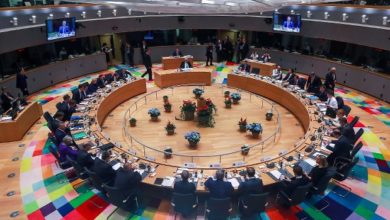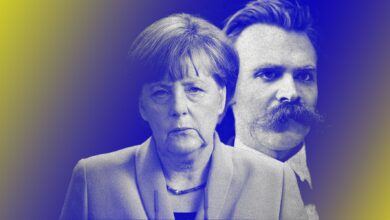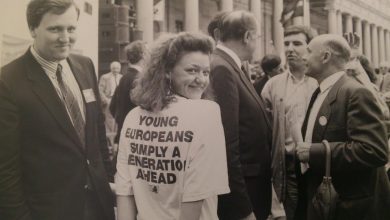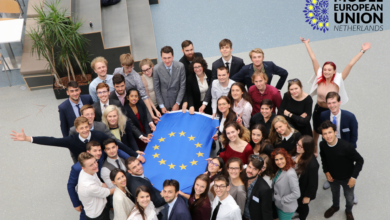[OPINION] Want to Defeat Radical Islam? Promote Education.

Terrorism is not new to our continent. From political turmoil in the Russian Empire to left-wing Basque separatist organisations like the ETA (Euskadi Ta Askatasuna), to neo-fascist groups such as the Italian Armed Revolutionary Nuclei (Nuclei Armati Rivoluzionari), the history of Europe is full with movements and people willing to embrace violence against civilians as a lever to enact political change. Different strategies have been employed to counter them, with considerable debate and disagreement not just on their outcomes but on their legality and ethics as well.
With radical Islam the latest addition to the European terrorist ecosystem, similar discussions are taking place in how best to counter it – particularly in France, which has recently witnessed the murder of French teacher Samuel Paty. Eighteen-year-old radical Islamist, Abdoullakh Abouyedovich Anzorov, is the person responsible for the murder, and the fallout from the crime is still reverberating in French society and politics.
Islam and radicalised communities
The radicalisation of Muslim communities living in Western European countries has deep roots, with old and new grievances and problems contributing to explain the phenomenon. There is little doubt, however, that the most recent shock to the system came from the deteriorating situation and spillover of the Syrian Civil War in Europe. This allowed terrorist groups like ISIS to weaponise modern technology such as social media to radicalise young Muslims in Europe, as well as key people in their communities – such as imams.
The turmoil surrounding the Syrian Civil War and its dislocations has allowed radical groups to establish an ideological foothold in Europe. This radicalisation has triggered episodes of brutality in the streets of cities across Western Europe, with the murder of Samuel Paty setting a sad record on the scale of violence.
The murder of Samuel Paty also broke precedent on such incidents, as it seems that the murder was not strictly motivated by adherence to a radical Islamic movement, but due to sheer intolerance of different opinions, with worrying implications for the prospects of Islam in Europe. This fact also raises concerns over the overall European approach to radicalism, which is essentially laissez-faire, “let-it-be until public opinion turns against it”.
When that switch does happen, responses tend to be knee-jerk and based on populism and stoking anger, rather than mending wounds. It is apparent that this approach simply doesn’t work and the philosophy behind it is fully illogical: central governments voluntarily choose not to use their tools and deliberately ignore the problem of radicalisation, until the popular mood turns so sour that putting forth sensible policies becomes impossible.

Western European states need to find a way to mitigate radicalisation within their Muslim communities. Needless to say, they equally need an effective strategy to defang extremism across the political spectrum, and the rise of right-wing extremism, in particular, poses a serious threat to the future of democracy in countries such as Italy and France. These movements have greatly capitalised on the dislocation caused by the battle against ISIS in Syria and Iraq, and have repeatedly made breaches into the mainstream by building their political narrative and cause around these questions.
As mentioned, however, the roots of radicalisation go deeper than just ISIS. Muslim communities in Western Europe were already marginalised and treated as a dangerous foreign community. This marginalisation has deprived people of a sense of belonging – belonging to the country that they were born in, and where they’d spent the majority or entirety of their lives. The insular mentality this has triggered has greatly amplified the power of fundamentalist imams to radicalise their communities. Any effective real-world solution which at once addresses the issue and combats the populist, far-right perspective of the matter, will have to go straight to the root of the problem – and look at successful examples of social cohesion.
A real-world example
The Greek Muslim community living in Western Thrace, on the border with Turkey, is a success story with many lessons for policymakers looking for inspiration. This region has a large Muslim community from a mixed ethnic background, coming at around 33% of the population. The minority enjoys several protections to guarantee an even keel with the Greek majority, including constitutional guarantees of non-discrimination, and political representation.
But where the integration process truly shines is in education: a dense network of minority schools provide education in Greek and Turkish. The schools are state-funded and aimed at minority students, with distinct curricula based on the unique social and cultural context of the local communities. Imams and religious scholars participate in this educational effort, which includes elective secondary education in religious studies in Turkish, and the Quran in Arabic.

This network includes two high schools, located in Komotini and Xanthi – where the concentration of Greek Muslims is highest. Public transportation for students living in isolated, rural or mountainous areas is subsidised by the state, to ensure no one falls through the cracks of the system, and Islamic theological seminaries are available for interested students, with an equal footing with Orthodox seminaries before the law. Additionally, 0,5% of slots in national higher education institutes are reserved to members of the Greek Muslim minority.
This set up has succeeded in keeping radical Islam out of the picture, and unable to get a foothold in a community that sees this arrangement as largely equitable. There are issues, of course. A particular point of contention is the appointment of muftis – currently split between the state and Greek Muslims, with a mufti appointed by the former and another elected by the latter. Controversies regarding citizenship clauses and the ethnic composition of the community are still existent. But these pale in comparison with the fractious relationship between Muslims in Western Europe and their countries.
Western Thrace offers a model for peaceful coexistence far removed from the far right’s cries for deportation or worse. State-funded mosques, a special curriculum in areas with high percentages of Muslims and positive discrimination measures would root out radical Islam and its ideological narrative. If we want to see things to change, we need to take real action and implement real strategies to properly assimilate the Muslim communities and root out the far-right’s rhetoric of radical Islam in Western Europe.
Guest article Aggelos Tzitziras. The author is an 18-year-old university student living in Heraklion, Greece, Member of the Greek Youth Parliament (2017-2018), and Press Secretary of the think tank Symmaxia (Alliance).





